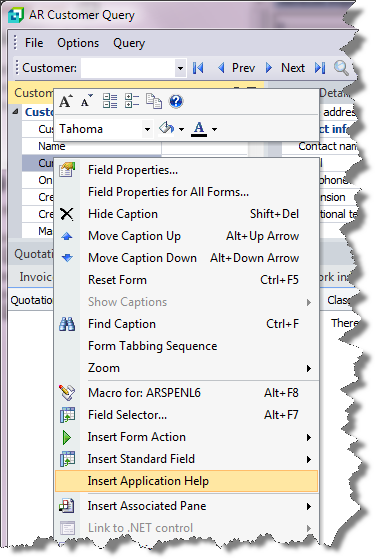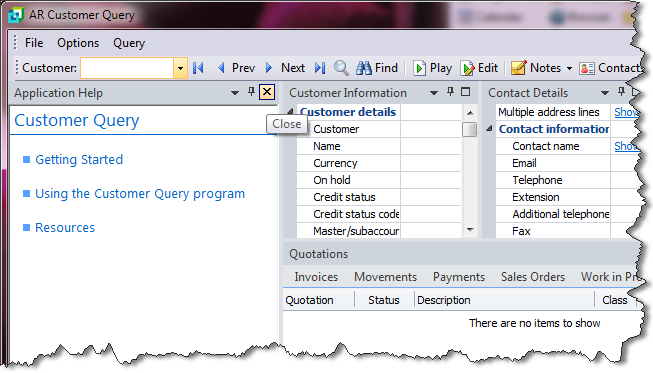You use this program to create and maintain your cost centers. In addition, you can assign default information to use for a group of work centers, such as costing rates, time and capacity units of measure and run time calculation methods.
- BOM Cost Center Maintenance
- BOM Work Center Update
- Cost Center Details - Internal
- Cost Center Details - Subcontract
- Cost Center GL Integration
- Cost Center Rates
- Notes and warnings
- Application Help Pane
| Field | Description |
|---|---|
| Cost center |
Indicate the code of the cost center you want to maintain. |
| Cost center type | |
| Internal | Select this to indicate that the cost center's rates are derived internally and that the work done in the cost center is performed on site. |
| Subcontract | Select this to indicate that the cost center's rates are derived from an external supplier (i.e. a subcontractor). |
| Function | |
| Update Work Centers |
Select this to optionally update the work center(s) associated with the cost center with all or part of the following information:
|
This screen is displayed when you select the Update Work Centers option from the Function menu.
| Field | Description |
|---|---|
| OK | Select this to update the selected work center(s) with the information selected. |
| Cancel | Select this to return to the previous screen without updating the selected work center(s). |
| Update Details | Select this to return to the previous screen without updating the selected work center(s). |
| Update all associated Work Centers | Select this to update all work centers associated with
the cost center with the selected information. Deselect this option to only update a single work center. When you deselect this option, the Work center to update field is made available, enabling you to indicate the single work center to update. |
| Work Center to update | You use this field to indicate the single work center
associated with the cost center, that you want to
update. This field is only made available when you deselect the option Update all associated work centers above. |
| Options | |
| Update additional information | Select this to update the work center(s) with the
following information from the current cost
center:
|
| Update rates (internal work center) | Select this to update the work center(s) with the labor rates from the current cost center. This applies to internal work centers only. |
| Update G/L codes | Select this to update the work center(s) with the General Ledger integration codes from the current cost center. |
You use this to assign default information for an internal cost center for use by the work center(s) allocated to the cost center.
| Field | Description | ||||||||
|---|---|---|---|---|---|---|---|---|---|
| General information | |||||||||
| Cost center | This indicates the code of the Cost center being maintained. | ||||||||
| Description | Assign a description to the cost center code. This description is printed on reports and can be used to verify that you entered the correct cost center. |
||||||||
| Use employee rates | Enable this to use the rates defined against the
employee instead of the rates held against the cost center.
The cost center overhead recovery rates are still applied. This is used in actual costing. |
||||||||
| Product class for billings | Assign a product class to all operations processed
within this cost center. This is used only by the Part Billings program where you can set a preference for detail operation lines to be inserted at the time of creating a sales orders. When left blank, the operation details are grouped according to the default product class specified in the Part Billings program. |
||||||||
| Product class description | Indicates the description for the Product class for billings. | ||||||||
| Run time calculation method |
The runtime calculation method you indicate for the work center determines which fields are enabled at the Run time option for operations in the Structures and Routings program. For example, if the run time method is defined as Unit, then you will need to enter the Unit run time. If the method is defined as Rate or Block, then you will need to enter the Quantity and Time taken for the unit run time to be calculated automatically.
|
||||||||
| Units of measure | If you made an entry at the option: Default description of time units (Bill of Materials Setup) then this is displayed at the Time and Capacity fields. | ||||||||
| Time | Indicate the time unit of measure for the cost center (e.g. hrs, min, etc). | ||||||||
| Capacity | Indicate the capacity unit of measure for the cost center (e.g. hrs, min, etc). This can differ from the time unit of measure. | ||||||||
| Overtime capacity | Indicate the percentage of overload permitted for the cost center. This is used only within the Forward Finite Scheduling program (Requirements Planning). | ||||||||
| Use overtime | Enable this to allow overtime for the cost center. | ||||||||
| Percentage | Indicate the percentage of overload permitted for the cost center. |
You use this to assign default information for a subcontract cost center for use by the work center(s) allocated to the cost center.
| Field | Description |
|---|---|
| Cost center | Indicates the code of the cost center being maintained. |
| Description | Assign a description to the cost center code. This description is printed on reports and can be used to verify that you have entered the correct cost center. |
| Supplier | Indicate the default supplier that the work centers allocated to this cost center will use. |
| Supplier name | Indicates the name of the Supplier. |
| Planner | Indicate the default planner that the work centers allocated to this cost center will use. |
| Planner name | Indicates the name of the Planner. |
| Buyer | Indicate the default buyer that the work centers allocated to this cost center will use. |
| Buyer name | Indicates the name of the Buyer. |
| Product class for billings | Assign a product class to all operations processed within this cost center. |
| Product class description | Indicates the description of the Product class for billings. |
You use this to assign the General Ledger codes to which you want to apportion productive and non-productive costs.
| Field | Description |
|---|---|
| Productive time ledger codes | Select this to indicate the ledger codes to which
productive time for the following must be posted:
|
| Non-productive time ledger codes | Select this to indicate the ledger codes to which
non-productive time for the following must be
posted:
|
| Ledger code | Indicate the ledger code to which subcontract costs
must be posted. This only applies to Subcontract operations. |
You use the Rates table to define the default rates applicable to an Internal Cost center.
The rates currently defined are displayed in the table.
These rates are used to cost labor and overheads for an operation that takes place in the work center. The Cost Implosion program uses these rates to establish the labor and overhead content of the standard cost of sub-assemblies and finished products.
| Field | Value | Description |
|---|---|---|
| Rate | This indicates the rate indicator number currently being maintained. | |
| Set-up | You use this field to indicate the rate at which you want to cost the labor used when a specific machine, line or work center converts from production of one item to another. Typically, no usable items are produced during the set-up period. | |
| Startup | You use this field to indicate the rate at which you want to cost the labor used when a specific machine, line or work center is gradually brought up to full production speed while producing good product. | |
| Run | You use this field to indicate the rate at which you want to cost the labor used to produce items at full production speed. | |
| Teardown | You use this field to indicate the rate at which you want to cost the labor used to remove setup from a machine or facility. | |
| Fixed o/h | You use this field to indicate the fixed overhead rate.
This is the rate at which you want to cost expenditures that do not vary with production (e.g. rent apportioned to the work or cost center). |
|
| Variable o/h | You use this field to indicate the variable overhead rate.
This is the rate at which you want to cost the expenditures that vary with production (e.g. electricity apportioned to the work or cost center). |
Electronic Signatures provide security access, transaction logging and event triggering. This enables you to increase control over your system changes.
Access to the following eSignature transactions within this program can be restricted at Operator, Group, Role or Company level. You configure this using the Electronic Signatures program.
| eSignature Transaction | Description |
|---|---|
| BOM Cost center added |
Controls access to the New Cost Center function in the Cost Centers and Browse on Cost Centers programs. |
| BOM Cost center changed |
Controls access to the maintenance of cost centers in the Cost Centers and Browse on Cost Centers programs. |
| BOM Cost center deleted |
Controls access to the Delete function in the Cost Centers and Browse on Cost Centers programs. |
-
The GL Integration fields are only validated if the Work in Progress module is linked to General Ledger (General Ledger Integration) in Detail or Summary.
Ledger codes can be entered, but they are not validated when GL Integration for Work in Progress is set to Not linked to G/L - distribution report.
Ledger codes cannot be maintained when GL Integration for Work in Progress is set to Not linked to G/L - no distribution report.
-
For subcontract cost centers you can define a single labor ledger code for the cost of labor postings that you want to apportion to the General Ledger.
Application Help Panes provide step-by-step instructions for various functions within the program, including a brief overview of what the program does, what setup options are required and how to personalize the program. The intention is that the pane provides information that is uncluttered and easy to navigate.
You can embed an Application Help Pane:
-
in the main SYSPRO menu
-
in any program with panes, if not using roles
-
when adding a role layout in Design Mode.
Inserting Application Help
You would typically follow this procedure to display help for the current program in a customized pane that can be pinned to the program window.
Information includes step-by-step instructions for the various functions available within the program, including a brief overview of what the program does, what setup options are required and how to personalize the program.
-
Open the program for which you want to insert application help into a customized pane.
This functionality is only available for a program that has panes.
-
Right-click any form field.
You can also click the triangle menu icon that appears in the title area of a pane.
-
Select Insert Application Help from the context-sensitive menu.
The application help appears in a pane within your program. You can reposition the pane using the docking stickers or pin it to the program window.
Removing the Application Help pane
If you no longer want to display application help in a pane for your current program, you can simply remove it.
-
Select the Close icon in the right-hand corner of the application help pane.
-
Confirm that you want to delete the pane.

